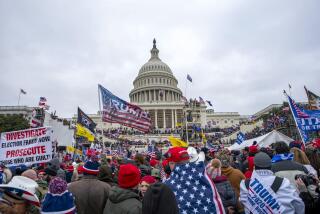Prosecutions called ‘a real stretch’
- Share via
WASHINGTON — Despite the growing demands to bring criminal charges against the authors of the so-called torture memos, even critics of the Bush administration see problems with seeking to prosecute lawyers such as John C. Yoo, Jay S. Bybee or Steven G. Bradbury.
First, the lawyers would have to be shown to have deliberately misinterpreted the law against torture.
“It would be a real stretch. As long as they thought they were honestly interpreting the [anti-torture] law, they are not criminal conspirators,” said Stephen A. Saltzburg, a law professor at George Washington University and a former prosecutor. “They may be bad lawyers who gave extremely bad advice,” he said, but that is not a crime.
The other problem looms even larger. How could the government prosecute the mid-level lawyers who wrote memos but not the top officials -- including former President George W. Bush and former Vice President Dick Cheney -- who ultimately authorized the waterboarding of suspected Al Qaeda operatives?
“That’s why this issue is so sensitive,” said Tom Malinowski, Washington director of Human Rights Watch. “Once you begin a serious discussion of criminal prosecution, the question quickly becomes: Why prosecute those in the middle of the chain of command but not those who made the ultimate decisions at the top?”
On Wednesday, a newly released timeline indicated that the Bush White House approved the CIA’s use of waterboarding in July 2002, pending the Justice Department’s legal blessing, which came a few weeks later. That too would complicate a move to prosecute the lawyers and not the higher-ups.
Three Senate Republicans, led by John McCain of Arizona, sent President Obama a letter Wednesday strongly urging him to steer clear of criminal prosecutions of Bush’s lawyers. “Providing poor legal advice is always undesirable,” the letter said, “but that is quite a different matter from making legal advice with which we disagree into a crime.”
House Speaker Nancy Pelosi (D-San Francisco) made it clear that Congress would pursue the matter regardless of whether anyone was charged. She said congressional committees and possibly a nonpartisan truth commission needed to investigate what happened.
She also would not rule out the possibility of impeachment proceedings against Bybee, who is a judge on the U.S. 9th Circuit Court of Appeals in San Francisco, if he were found to have misled Congress during his confirmation hearing in 2003.
Karl Rove, Bush’s top political advisor, accused Obama of seeking “show trials” of former administration officials. “If the Obama administration insists on criminalizing policy disagreements, how can they place any limits who they prosecute?” he said.
Most criminal-law experts said they were uncomfortable with the idea of prosecuting lawyers over memos. One principle of criminal law is that the crime should be clear and obvious.
In this instance, a prosecutor would have to show that Yoo or Bybee intentionally misstated the anti-torture law. “Given the somewhat subjective basis for almost all legal analysis, I don’t know how you would ever prove that,” said Stanley Brand, a Washington lawyer and onetime counsel to former House Speaker Thomas P. “Tip” O’Neill Jr.
“You would have to show they knowingly gave bogus advice,” said Peter Zeidenberg, a former prosecutor in the Justice Department’s public integrity unit. “Theoretically, you could do it, but only if you had evidence they knew that’s what they were really doing.”
Legal experts said they would see the matter differently if the focus was on war crimes and international law.
Saltzburg and others said Americans would probably be inclined to bring war crimes charges against a former official who authorized the waterboarding of a U.S. agent.
“I admit I feel hypocritical about that,” he said. “If one of our soldiers or CIA agents had been captured by Saddam [Hussein], waterboarded and put in box, and we found out who authorized it, we would insist on prosecuting that person for war crimes.”
Malinowski said there would be a legal consensus in favor of a war crimes prosecution if a American had been waterboarded by Iran, Iraq or North Korea.
“There would be no controversy, no debate,” he said. “We would seek to prosecute any foreign official who authorized the commission of those acts on an American. And no one would buy the excuse that one of those dictators was relying on the advice of his legal counsel.”
--
josh.meyer@latimes.com
James Oliphant in the Washington bureau contributed to this report.
More to Read
Sign up for Essential California
The most important California stories and recommendations in your inbox every morning.
You may occasionally receive promotional content from the Los Angeles Times.














